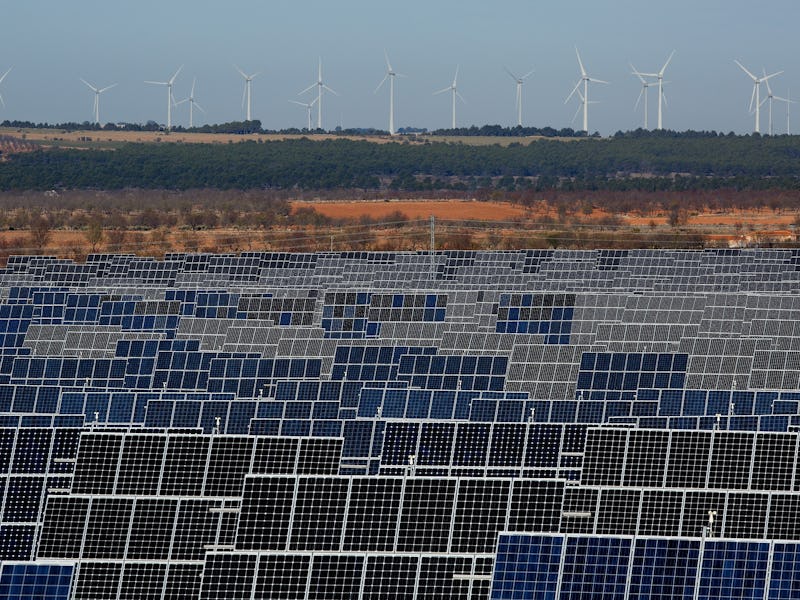The Paris Climate Deal Is Already Making a Difference and It Isn't Signed Yet
Descriptions of a carbon-neutral world no longer sound fantastical.

Two months ago, representatives of 196 countries reached a consensus. They made an agreement designed to end the fossil fuel era. But did the Paris climate change accord change the world or did it merely kick the can a bit harder and farther than usual? Months later, it’s worth a status check.
The answer is a qualified yes even though the official signing party isn’t until April 22. No, the world didn’t really change overnight. Market-watchers saw stocks dip for fossil fuel companies and rise for renewables, but those were market adjustments, not substantive change. And with Obama’s efforts to regulate coal emissions on hold, some commenters have suggested the Paris agreement could already be in serious trouble.
Still, change — as well as a great deal of soot — is in the air.
A shrub clings to the edge of the massive Nochten open-pit lignite coal mine as the Boxberg coal-fired power plant is visible behind on August 4, 2008 near Weisswasser, Germany.
Here’s what the Paris Agreement did: It made it possible to imagine a zero-emission future. For the agreement to reach its intended goal of limiting warming to “well below” two degrees Celsius and pursuing efforts to limit to 1.5 degrees, the world would have to reach zero net emissions around the middle of this century. That’s soon! It’s an ambitious — some might say impossible — goal, but with the Paris deal, the countries of the world have announced that it is a worthy goal, and one they are committed to pursue.
The result is a planet where long-term investment in fossil fuels is no longer seen as a viable option. Norway’s $794 billion sovereign wealth fund recently divested from 73 companies, mostly coal energy companies, because their environmental policies posed a risk to long-term profitability.
InfluenceMap recorded a “flurry of pro-climate policy activity immediately prior to and following” the Paris talks by corporations, according to a recent report. The think tank called the Paris event a “tipping point” for corporate attitudes towards policy that supports a low-carbon future.
Fossil fuel companies themselves are starting to see the writing on the wall. Just this week top brass at BP gave support for a global price on carbon emissions. The announcement came at an International Petroleum Week session on the future of fossil fuels in a carbon-constrained world. It was the first time the conference has dedicated time specifically to discussing climate change.
A company electric Smart car of German engineering company Siemens, at the behest of the photographer, stands attached via a charging cable from a sidewalk-mounted charger on April 1, 2010 in Berlin, Germany.
You might expect that enthusiasm for renewable power would have waned over the past year, after a crash in oil prices left the world awash in cheap fuel, but that hasn’t been the case. People and governments continue to see renewables are more socially desirable, and also less risky in the long run. Which, really, should be a no-brainer: a product based on extracting a material of finite supply can only get more expensive in the long run, while products based on technology tend to get exponentially cheaper.
The Paris conference solidified a new global perspective: Fossil fuels are risky today, and will be obsolete tomorrow. Who wants to be beholden to dramatic price swings, mostly at OPEC’s whim? Certainly not Nigeria, Venezuela, and Russia — some of the oil-producing countries that were worst hit by the recent price crash. Political upheaval has accompanied the price shock for those oil exporters and others, and along with it a push to diversify the economy to insulate from future swings.
Low oil prices means something else — more oil and gas companies closing shop while those that stay open invest less in exploring for new resources. Prices won’t stay low forever, but when they go back up, it will be in a world more and more electric cars and bigger solar farms. The world’s oil supply will never dry up, but demand for it just might evaporate.